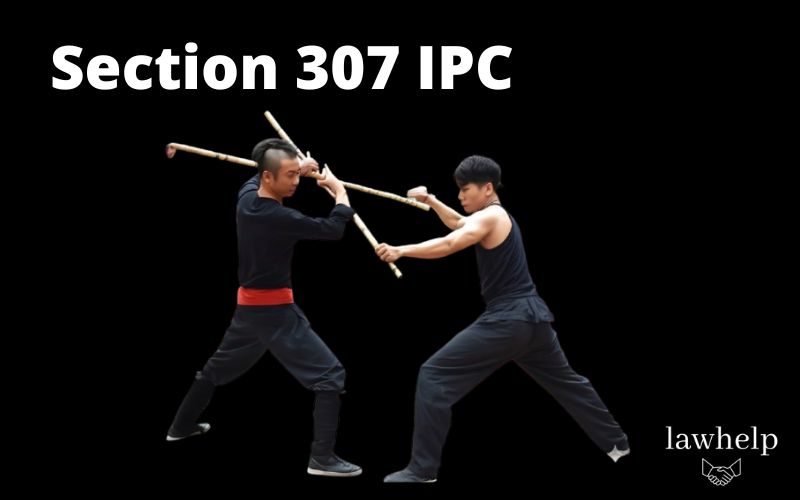Table of Contents
Attempt To Murder
Section 307 IPC of the Indian Penal Code defines “Attempt to Murder”. In a Simple language if any person do such act with intention to kill somebody, which in normal course of life can cause death of the other person then this Section 307 IPC will be attracted.
Punishment for Attempt to murder
Whoever does any act with such intention or knowledge, and under such circumstances that, if he by that act caused death, he would be guilty of murder, shall be punished with imprisonment of either description for a term which may extend to ten years, and shall also be liable to fine; and if hurt is caused to any person by such act, the offender shall be liable either to imprisonment for life, or to such punishment as is hereinbefore mentioned.
Attempts by life convicts
When any person offending under this section is under sentence of imprisonment for life, he may, if hurt is caused, be punished with death.
Illustrations
- A shoots at B from his gun with intention to kill him, but B managed to run away from the spot and saved his life. A is liable to be punishment under this section.
- A, with the intention of causing the death of a child of tender years, leaves the child at a desert place. A has committed the offence defined by this section, though the death of the child does not ensure.
- A, intending to murder B, buys a gun and loads, it. A has not yet committed the offence. A fires the gun at B. He has committed the offence defined in this section, and, if by such firing he wounds B, he is liable to the punishment.
- A, intending to murder B, by poison, purchases poison and mixes the same with food which remains in A’s possession; a has not yet committed the offence defined in this section. A now places the poisoned food on B’s table or delivers it to B’s servant to place it on B’s table. A has committed the offence defined in this section.
Section 307 IPC Punishment
If a person is convicted under this section then he can be awarded Imprisonment for life or imprisonment of 10 years or fine.
If a person who is already under life imprisonment and he cause hurt under this section to another person then he can be awarded Death or Imprisonment for life or Imprisonment for 10 years or fine.
Section 307 IPC Which Court to try offences
Offences under Section 307 IPC are exclusively triable by the Sessions Court. To justify conviction under section 307 IPC it is not essential that bodily injury capable of causing death should have been inflicted. It is sufficient in law to convict a person if the intent to kill coupled with overt act is present in the case.
Section 307 IPC Bailable or non-Bailable?
Section 307 IPC is non-bailable that means police officer or the magistrate court cannot grant him bail. Person has to move to the Sessions Court or the High Court for the Bail.
If a person accused of Section 307 IPC wants to file Anticipatory Bail then he can directly move to the concerned High Court.
Compromise in Section 307 IPC, allowed or not?
Although Section 307 IPC is non compoundable that means in normal course compromise with the complainant will not be allowed. But there are many judgments of the High Courts and the Supreme Court whereby compromise was allowed under this section. So allowing or not allowing of Compromise with the complainant will depend upon the present view of the concerned court.
Compounding of Section 307 IPC Supreme Court
In the case of (Narinder Singh & others Vs State of Punjab & anr, 2014) Hon’ble Supreme Court laid down the criteria for the High Courts to follow in allowing or disallowing the compromise under section 307 between the parties.
Offenses under Section 307 IPC falls in the category of heinous and serious offenses and therefore is to be normally treated as a crime against society and not against the individual alone.
However, the High Court should not rest its decision merely because there is a mention of Section 307 IPC in the FIR or the charge is framed under this provision.
It would be open to the High Court to examine as to whether incorporation of Section 307 IPC is there for the sake of it or the prosecution has collected sufficient evidence to prove their case. The evidence if proved would lead to proving the charge under Section 307 IPC.
Having said so, we would add that though it is a very serious offense as the accused person attempted to take the life of another person. At the same time, the court cannot be insensible to hard realities.
That many times whenever there is a quarrel between the parties leading to physical upheaval and sustaining of injury by either or both the parties, there is a tendency to give it a slant of an offense under Section 307 IPC as well.
Therefore, only because FIR/Charge-sheet incorporates the provision of Section 307 IPC would not, by itself, be a ground to reject the petition under section 482 Cr.P.C. for compromise. This alone should not be the ground to refuse the settlement between the parties.
We are therefore of the opinion that while deciding as to whether compromise in such cases should be allowed or not. The High Court should go by the nature of injuries sustained.
High Court should assess on what parts of the bodies the injuries were inflicted. Whether injuries were caused on the vital parts or the non-vital parts of the body? The nature of weapons used in the crime etc.
On basis of that, if it is found that there is a strong possibility of conviction under Section 307 IPC. Once the evidence to that effect is led, injuries & charges proved then the Court should not accept settlement between the parties.
On the other hand, after prima facie assessment of the aforesaid circumstances, if the High Court concludes that provision of Section 307 IPC was not necessary to be included in the FIR/charge sheet, the Court can accept the plea of compounding of the offense based on settlement between the parties.
Important Supreme Court of India Cases on Section 307 Indian Penal Code
State of Maharashtra v. Balram Bama Patil (1983):
The Court emphasized that for a conviction under Section 307 IPC, the prosecution must prove that the accused had the intention or knowledge that their act could cause death. The severity of the injury is a factor, but the intention behind the act is paramount.
Om Prakash v. State of Punjab (1961):
In this case, the Supreme Court clarified that the nature of injuries inflicted is not the sole criterion for determining an offense under Section 307 IPC. Even if the injuries are minor, if the act is done with the intention or knowledge that it could cause death, it would amount to an attempt to murder.
Sarju Prasad v. State of Bihar (1965):
The Court held that to justify a conviction under Section 307 IPC, it is not essential that bodily injury capable of causing death should have been inflicted. The nature of the act, the intention, and the circumstances play a crucial role in determining the applicability of this section.
State of M.P. v. Saleem (2005):
The Supreme Court observed that the intention or knowledge of the accused can be inferred from the circumstances, the nature of the weapon used, and the severity of the blow. Even if the injury inflicted is simple, the offense can fall under Section 307 IPC if the intention to cause death is evident.
Jage Ram v. State of Haryana (2015):
In this judgment, the Court reiterated that the intention to kill is a crucial component for an offense under Section 307 IPC. The nature of the injuries, the weapon used, and the circumstances are all factors that help determine this intention.
State of M.P. v. Kanha (2019):
The Supreme Court highlighted that the mere fact that the injury inflicted was not sufficient to cause death does not by itself preclude the applicability of Section 307 IPC. The intention or knowledge with which the act was done is the determining factor.
State of Rajasthan v. Shambhu Kewat (2013):
The Court held that offenses under Section 307 IPC are of a heinous nature and generally should not be quashed merely on the basis of a compromise between the parties, as they are crimes against society.
Sukhram v. State of M.P. (2022):
In this case, the Supreme Court set aside a conviction under Section 307 IPC, observing that the injuries inflicted were simple and there was no clear intention to cause death. The Court modified the conviction to a lesser offense under the IPC.
State of M.P. v. Deepak (2014):
The Supreme Court emphasized that while exercising powers under Section 482 CrPC, the High Court should be cautious in quashing FIRs involving offenses under Section 307 IPC, as these are serious offenses affecting society at large.
Shoyeb Raja v. State of M.P. (2024):
The Court clarified that the minor nature of injuries sustained by a victim is not a sufficient reason to dismiss charges under Section 307 IPC. The intention behind the act is the critical factor in determining the applicability of this section.
If you have any questions regarding Section 307 IPC you can ask in the comments section below.
Read Indian Penal Code for more details.




